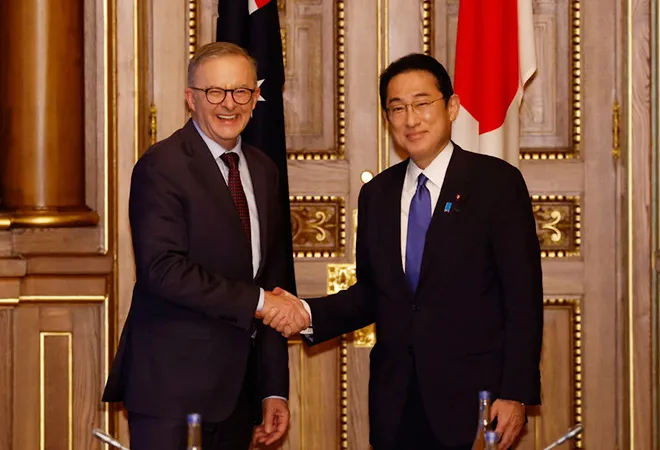-
CENTRES
Progammes & Centres
Location
The recently revised joint declaration between Japan and Australia seeks to further boost their relations

Japan and Australia are vital for each other’s economic and strategic interests and are also key players in the Indo-Pacific region. Both countries share a common commitment towards democracy, rule of law, and human rights. Prime Ministers of Australia and Japan signed a revised Joint Declaration on Security Cooperation (JDSC) on 22 October to boost their security cooperation. Their relationship also saw a boost after the 2007 Joint Declaration on Security Cooperation (JDSC) and the Japan-Australia Economic Partnership Agreement signed in 2015.
Both Japan and Australia have a strong and close alliance with the United States (US) and other nations India, and South Korea. The two countries have formed their security partnership which includes areas of border security, counter-terrorism, law enforcement, disarmament, maritime security and humanitarian assistance operations. They annually hold the 2+2 talks between their Foreign and Defence Ministers and in the 2021 2+2 talks, both nations reaffirmed their commitment to work towards promoting a free, open and prosperous Indo-Pacific.
The Japanese Prime Minister Fumio Kishida and his Australian counterpart, Anthony Albanese, deepened their commitment to working together in ensuring a rules-based order in the Indo-Pacific region where disputes shall be resolved peacefully.
The recently revised joint declaration on security cooperation between Japan and Australia has covered several aspects including military, cyber security, and intelligence among others. This change is fundamentally driven by China’s expansionist behaviour and its assertiveness. This declaration has been built with reference to the Reciprocal Access Agreement (RAA) between the two countries which was signed in January 2022 and allows deeper cooperation between their militaries. Japan also declared that its Self-Defence Forces (SDF) would take part in military exercises with the Australian military. The Japanese Prime Minister Fumio Kishida and his Australian counterpart, Anthony Albanese, deepened their commitment to working together in ensuring a rules-based order in the Indo-Pacific region where disputes shall be resolved peacefully. It is vital for both nations to enhance their cooperation with the US for their strategic alignment and interoperability. Both nations also focus on supporting the ASEAN centrality and the ASEAN outlook on the Indo-Pacific for a secure and stable region.
Australia is deeply committed to making Japan one of its closest security partners which is particularly enshrined in the strategic relationship between the two nations. In terms of economic cooperation, Japan and Australia aim to build resilient supply chains for promoting their economic security which would also include clean energy technologies and promoting quality infrastructure. Furthermore, the Ukraine-Russia war has threatened the energy security of both these countries, thus, they must cooperate more closely on this issue. Energy security would also see a boost through Japan’s access to LNG, critical minerals, and hydrogen as both Japan and Australia aim to achieve net-zero targets by 2050. A critical minerals partnership between Japan and Australia which includes rare earth is also crucial to strengthen supply chains for Japanese manufacturers. Besides this, both countries have been working on strengthening their cyber defences as well.
A critical minerals partnership between Japan and Australia which includes rare earth is also crucial to strengthen supply chains for Japanese manufacturers.
In this revised security declaration, a strong emphasis was laid on the 2+2 talks between Japan and Australia and also a commitment to focus on regional issues which make this revised declaration significant. The declaration signed in 2007 had put forth the very foundation for extensive security cooperation between the two nations and the revised declaration has emphasised the need for a reciprocal access agreement to be implemented. The development of security and defence relations between Japan and Australia is vital as during the 2007 declaration, Japan did not have the right to exercise collective self-defence owing to its constitutional constraints. Furthermore, Japan enacted the peace and security legislation in 2015 which allowed Japan’s Self-Defence Forces to protect the military personnel and to exercise the right to collective self-defence in a situation that threatens survival. Therefore, the SDF has the right to assist the Australian Defence Forces at the time of emergency.
One of the noteworthy agendas behind the security declaration between Japan and Australia is China’s threat as both nations strive to maintain a free and open Indo-Pacific as well as a rules-based international order. The joint statement between Anthony Albanese and Kishida also mentioned the stability across the Taiwan Strait which has geopolitical implications for the Indo-Pacific region. Since the Ukraine crisis erupted, Japan has been facing energy insecurity and Australia has been the supplier of energy for Japan. Moreover, Japan is keen on securing Liquified Natural Gas (LNG) for its future needs which were also discussed in the meeting between the leaders of Japan and Australia.
The joint statement between Anthony Albanese and Kishida also mentioned the stability across the Taiwan Strait which has geopolitical implications for the Indo-Pacific region.
The emergence of a trilateral security partnership involving Australia, the United Kingdom and the United States, AUKUS in September 2021 has strengthened the minilateral cooperation in the Indo-Pacific amidst China’s expansionist behaviour. AUKUS aims at promoting deeper technology sharing, industrial bases and supply chains and also enhancing the joint capabilities and interoperability of the three countries. Japan was quite surprised by Australia's decision to work on building attack nuclear submarines in close cooperation with the US and UK. The pact further aims at increasing Australia’s commitment to ensure stability in the Indo-Pacific region which has been appreciated by Japan. Moreover, Australia’s nuclear-powered submarines will work on patrolling the South China Sea to maintain a balance of power in lieu of China’s actions. The AUKUS would also strengthen the UK’s involvement in the Indo-Pacific region which will help Japan to deepen its defence ties with the UK. Australia is likely to become the world’s seventh nuclear submarine power which would eventually impact the security as well as Japan’s inclination towards non-proliferation policy.
Furthermore, Australia’s capability in developing Anti-Submarine Warfare implies that it would be involved in the East Asian dynamics and in the South China Sea. This could prove to be desirable for Japan’s security to be able to tackle the threat posed by China. AUKUS is a good example for Japan to consider enhancing its defence efforts and also to work on maintaining the Free and Open Indo-Pacific through collaboration with other like-minded countries.
Australia’s capability in developing Anti-Submarine Warfare implies that it would be involved in the East Asian dynamics and in the South China Sea.
The increasing power and influence of the Quad are also leading to better security ties between its member countries, for instance, India-Japan and Japan-Australia ties. Japan and Australia are nations that consider efficient energy flows as an important part of their national security and therefore, will continue deepening their partnership in the energy sphere as well. Australia is also attempting to work towards ending its dependency on China by diversifying its exports of natural resources like gas and coal as Japan seems to be a profitable alternative. Both Japan and Australia point out that they are making efforts to prepare themselves to use their defence forces to assist each other’s strategic goals wherein, they also give importance to the support of the US for forging similar relationships. Japan is one of the strongest alliances of the US while the US-Australia alliance, too, is strong and vital for stability in the Indo-Pacific and around the world. It is a win-win situation for both Japan and Australia to maintain their alliance with the US which would develop close Tokyo-Canberra ties and further help in maintaining a rules-based order. With the increasing great power competition, it has become even more important for Japan and Australia and other regional actors to maintain an inclusive security order in the Indo-Pacific region.
The views expressed above belong to the author(s). ORF research and analyses now available on Telegram! Click here to access our curated content — blogs, longforms and interviews.

Simran Walia is an Associate Fellow at the Centre for Air Power Studies, New Delhi and is pursuing PhD in Japanese Studies under the Centre ...
Read More +